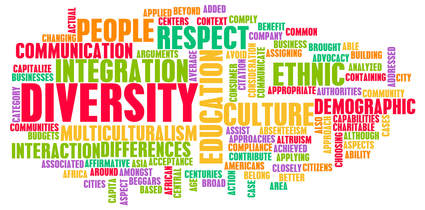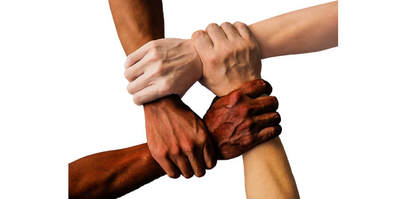
I Corinthians 12:4-6 NKJV There are diversities of gifts, but the same Spirit. There are differences of ministries, but the same Lord. And there are diversities of activities, but it is the same God who works all in all.
1 Corinthians 14:12 NLT And the same is true for you. Since you are so eager to have the special abilities the Spirit gives, seek those that will strengthen the whole church.
Ephesians 4:11-14 NLT Now these are the gifts Christ gave to the church: the apostles, the prophets, the evangelists, and the pastors and teachers. Their responsibility is to equip God’s people to do his work and build up the church, the body of Christ. This will continue until we all come to such unity in our faith and knowledge of God’s Son that we will be mature in the Lord, measuring up to the full and complete standard of Christ. Then we will no longer be immature like children. We won’t be tossed and blown about by every wind of new teaching. We will not be influenced when people try to trick us with lies so clever they sound like the truth.
These following are excerpts from a sermon by Craig Watts, pastor of Royal Palm Christian Church in Coral Springs Florida. In his sermon Pastor Watts talks about God’s will for the Church to be a Christ-centered community of diversity. (To read the complete sermon go to Preaching.com)
Craig M. Watts (Full text of Scriptures added by me) (Bold mine)
Romans 14:1-9 NLT Accept other believers who are weak in faith, and don’t argue with them about what they think is right or wrong. For instance, one person believes it’s all right to eat anything. But another believer with a sensitive conscience will eat only vegetables. Those who feel free to eat anything must not look down on those who don’t. And those who don’t eat certain foods must not condemn those who do, for God has accepted them. Who are you to condemn someone else’s servants? Their own master will judge whether they stand or fall. And with the Lord’s help, they will stand and receive his approval. In the same way, some think one day is more holy than another day, while others think every day is alike. You should each be fully convinced that whichever day you choose is acceptable. Those who worship the Lord on a special day do it to honor him. Those who eat any kind of food do so to honor the Lord, since they give thanks to God before eating. And those who refuse to eat certain foods also want to please the Lord and give thanks to God. For we don’t live for ourselves or die for ourselves. If we live, it’s to honor the Lord. And if we die, it’s to honor the Lord. So whether we live or die, we belong to the Lord. Christ died and rose again for this very purpose—to be Lord both of the living and of the dead.
Whether or not we are big fans of diversity, the fact is we are experiencing more and more of it. And it comes in all forms: a greater range of entertainment options, a wider selection of foods at the supermarket, more car companies and models than ever before, more ethnic restaurants and the list goes on. During a routine trip to the mall, it’s not that unusual to overhear two or three foreign languages. If you go to the hospital some of the doctors treating you are likely to be from India, Egypt, South Africa or any number of other places.
Some people are enthusiastic about this increase in diversity. They see the richness of the difference as something that benefits us all. The mix of cultures and races and opinions provide opportunities to learn from others and grow in understanding. Hence, many call us to celebrate diversity. But others are not ready to party. Instead of finding reason for joy, some find reason for fear and insecurity and even hostility. The old rules we used to take for granted have been shaken. Cherished convictions are challenged. Diversity has led to division: political, racial, gender, cultural and economic division. There has always been some of this, but now it seems to be more prevalent.
But God has something to say about all of this. The church is what God has to say. The Church is called to be a Christ-centered community of diversity. Its very life proclaims the power of God to overcome the divisions that set people against each other. In his letter to the Galatians, the apostle Paul announced, “In Christ there is neither Jew nor Greek, there is neither slave nor free, there is neither male nor female; for you are all one in Christ Jesus.” (Galatians 3:28). The church is to live as a people touched by God's grace and no longer defined by the divisions that plague the world.
At least that’s what God expects. But that is not what we find in far too many cases. Too often the divisions of the world are brought right into the church. Instead of reflecting the light of Christ, we mirror the broken world. Women are discriminated against, racial segregation persists and whenever an international conflict arises, those in the church are frequently uncritical cheerleaders for our nation’s side in the hostility. But on top of all that, the church has its own problems with diversity. Differences in practice and opinion become occasions for distrust and fragmentation.
Among ecumenically minded Christians, unity in diversity has been one of our strong values. But as I recently heard it said, we sing our hosannas to the principal, but in practice too quickly we hear the cries, “Crucify him, crucify him.” No matter how much we claim that we value diversity, living with it is tough work.
But it’s always been that way, all the way back to the first century. Differences between church members have strained the fabric of fellowship. In the scripture passage that we are considering we find an ancient church that is no dealing with its diversity very well.
In the Roman church, the threat of division was over whether or not it was more spiritual to be vegetarian. You had the salad group and the steak group. And some argued over whether or not to celebrate special holy days. They took these issues very seriously. Naturally, we tend to think that our issues are much more important. They probably aren’t.
 Photo Credit: Creative Commons - Diversity Council Robins AFB Base
Photo Credit: Creative Commons - Diversity Council Robins AFB Base
Why do they? At work, in society, in church, why does diversity so often bring hurtful divisions?
First of all, we tend to be wary of those who are different from us. When people look, or act, or even think unlike the way we do, we’re not sure what to expect of them. They make us uncomfortable, even fearful. And in our fear we may even be tempted to strike out.
Not long ago two brothers, Matthew and Tyler Williams, were arrested for murder. The police believe they committed the shotgun slaying of a gay couple in California. Evidence also links them to the arson fires of three synagogues. Not many of us are inclined to kill or destroy property because of the differences we face. But sometimes we do have a shoot first, ask questions later, approach. We don’t normally shoot at someone’s body but we might take pot shots at their character. And we feel justified. We imagine we have to defend ourselves. But it’s all in our minds. The person who differs from us isn’t necessarily against us.
There is a second closely related reason why differences can bring division. We attribute bad motives to the actions of others. If our viewpoint or values are challenged by someone, it may hurt our feelings. We may get angry. If someone hurts or angers us, most of us have a hard time believing that other person’s heart is pure. The religious leaders in Jesus’ time certainly weren’t happy that He challenged them. They questioned His motives. They even claimed that the healings He performed were done by demonic power. Of course it was His accusers who had the real problem.
Studs Terkel tells a story of a friend of his, a progressive older woman. For years she had opposed Jim Crow laws, fought segregation and supported civil rights. But one day a disturbing thing happened as she drove into a section of town almost entirely populated by African American people. As her car moved down the street she saw folks gesture wildly at her. They were shouting at her car, but she couldn’t hear what was being said. Person after person yelled and waved their hands at her. She was certain of one thing: these people were threatening. Finally after driving a few more blocks she made a discovery. She had been driving the wrong way on a one-way street. The people she thought were threatening her were in fact trying to help her.
A third reason diversity can bring division is because people with different values or interests can become destructively competitive. Some time back I heard a news report about the ineffectiveness of the California delegation in the U.S. Congress. California has more representatives than any other state. You’d think they could accomplish a lot. But the representatives apparently have a knack for paying more attention to what makes them different from each other than seeing what they share in common. So rather than working together to promote the interests of the entire state, each representative works only for the interests of his or her little piece of the state. In the end all suffer.
It can be that way in the church, too. People can become so intent on defending turf or promoting the interests of the few that they forget the mission of all. Jesus prayed for His people saying, “I ask … that they may all be one … so that the world may believe You have sent Me.” (John 17:20-21) We can all contribute to the mission of the church. But the mission of the church as a whole rather than the interests of those most like us must be the primary concern.
Well, differences are not going to just fade away in society or in church.
 Photo credit: Creative Commons - Cascade Business News
Photo credit: Creative Commons - Cascade Business News
What can we do to live with our differences in a way that honors Christ and is good for the church?
First, open your own life to change. Naturally we want the people who differ with us to make the change. We tend to make our own practices and opinions the standard of truth. There is an old “Cathy” cartoon strip that speaks to this. Cathy is walking along with another woman, talking about her boyfriend. “I know Irving and I are totally different people, Andrea. But we keep coming back to each other,” says Cathy. With a look of love on her face she continues, “Down deep, I think we both want exactly the same thing.” Then with a frustrated expression in the last frame she says, “We both want the other person to change.” That’s the way it is with us, isn’t it? But we need to be open to change, too. In 1 Corinthians 13 the scripture tells us, “Love does not demand its own way.”
Romans 13:8-10 NLT Owe nothing to anyone—except for your obligation to love one another. If you love your neighbor, you will fulfill the requirements of God’s law. For the commandments say, “You must not commit adultery. You must not murder. You must not steal. You must not covet.” These—and other such commandments—are summed up in this one commandment: “Love your neighbor as yourself.” Love does no wrong to others, so love fulfills the requirements of God’s law.
Second, recognize that you don’t have the right to judge the motives of others. To attribute bad motives on the part of people who differ with us is to guarantee trouble. As the apostle Paul wrote to the Romans, “Who are you to pass judgment on the servants of another? It is before their own Lord that they stand or fall” (Romans 14:4).
Third, we need to recognize that there is sometimes more than one right way to think and to behave. The choice is not always between right and wrong. Yes, some things are black and white, evil or good. But most aren’t. Many decisions are based on taste, preference or tradition. God is equally honored by vegetarians as by carnivores. God can equally be honored by an organ or a kazoo. Decisions in these matters are not about right and wrong. So the apostle Paul writes in our Scripture text, “Welcome one another … but not for the purpose of quarreling over opinions.” (Romans 15:1; Romans 14:1) In other words, don’t make a big deal over differences. Don’t allow controversy over opinions to be the center of your conversation. Welcome one another.
Fourth, we need to recognize that no one of us, and no single group of people like us, can stand alone. We need each other to do what God calls us to do in the world. Only as we live with each other, differences and all, are we whole, healthy and prepared to serve God. All of us are flawed. All of us need to be forgiven; so, too, we need to forgive. When we come together with our brokenness, together we can serve God. As Paul wrote, “We do not live to ourselves and we do not die to ourselves.”
Some years ago in the Durham, North Carolina Morning Herald there was a story about two female musicians who performed together. One was black and the other, white. They called their duo Ebony and Ivory. Both of the women were handicapped. One had lost her left hand in an accident. The other had lost her right hand. Neither knew of the other, but both were brokenhearted after the tragedy they had individually faced. Each of them believed she would never again experience the joy of her life, the joy of creating the sound of music.
But a third woman heard of the plight of the injured musicians and put them in contact with each other. When the two one-handed pianists came together, they found that each could supplement the loss of the other. Together they could again play their beloved piano. When the black hand and the white hand were skillfully coordinated with each other, the maimed musicians could coax beautiful sounds from the instrument.
God calls us together in our brokenness and with our differences. God has given us to each other. Each supplements what is missing in the other. Together and only together with our differences are we whole and ready to serve. So in the words of scripture, “Welcome one another … just as Christ has welcomed you for the glory of God.” (Romans 15:7).
More from one of my favorite arthurs.
From Vanishing Grace
by Philip Yancey
One gray fall day in Denver I visited an urban church that makes grace the center point of ministry. This congregation addresses the contentious gay issue not by writing position papers but simply by welcoming all who come. Their bulletin expresses it this way:
Married, divorced or single here, it’s one family that mingles here.
Conservative or liberal here, we’ve all gotta give a little here.
Big or small here, there’s room for us all here.
Doubt or believe here, we all can receive here.
Gay or straight here, there’s no hate here.
Woman or man here, everyone can serve here.
Whatever your race here, for all of us grace here.
In imitation of the ridiculous love Almighty God has for each of us and all of us, let us live and love without labels.

 RSS Feed
RSS Feed